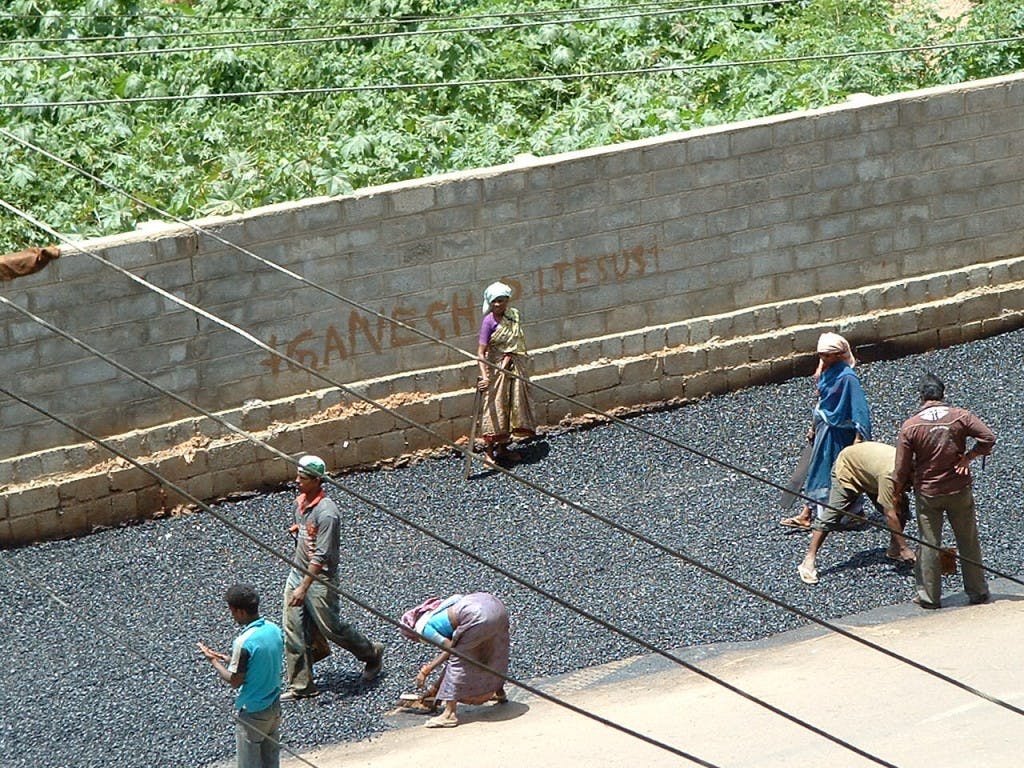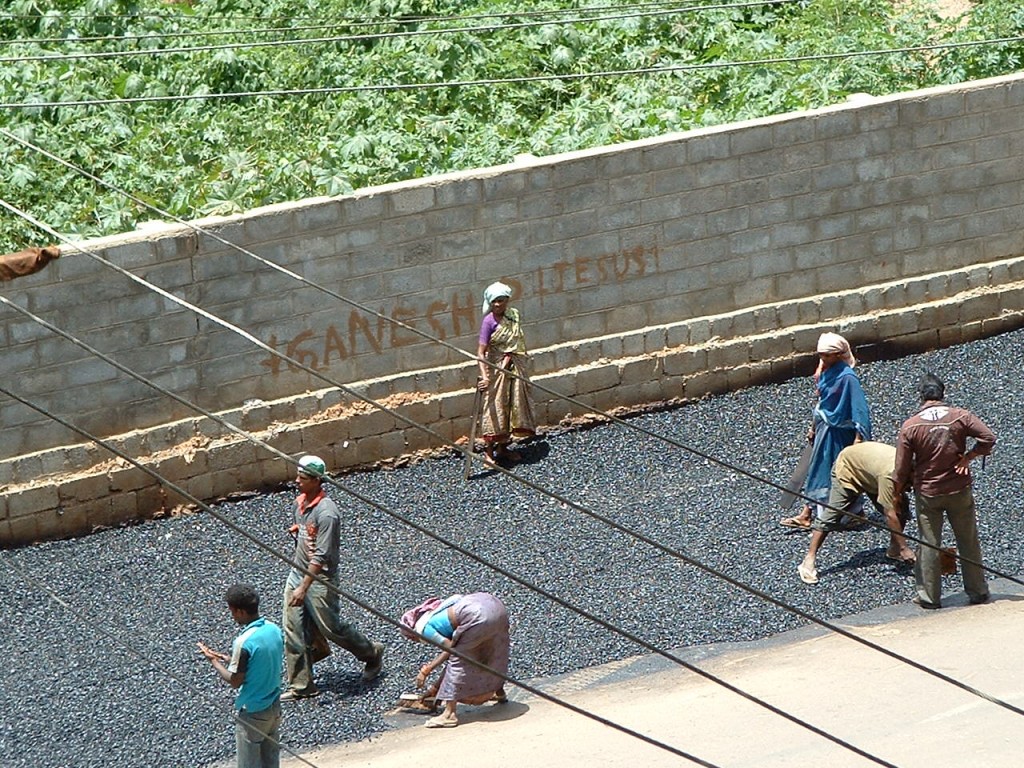Visible people, invisible tales
May 13, 2019
Story


Labour day. International Workers' Day. These are two phrases that herald the importance of the annual holiday on 1st May. In many countries, trade or employee unions and their supporters organize rallies and other events to highlight workers' contributions and challenges. May day commemorates labourers' struggle for an eight hour work day. This policy is implemented strictly in some nations and some industries in India. However, many workers toil for over eight hours everyday particularly in the informal economy that facilitates inexpensive services, accounts for over 90% jobs and workers that exceed 400 million (more than 50% of whom are women) and contributes to around 50% of the national Gross Domestic Product. In urban locales, these workers include construction labourers, wayside cafeteria assistants, domestic and commercial helpers, security guards, factory workers, municipal cleaners et al. Rural India has agricultural labourers, stone quarry workers, waste pickers, etc.
Most employed in the informal sector in India play an important role in the lives of people in the middle and higher income groups. These workers collect garbage, clean or safeguard homes and offices, build banks, hospitals, schools, harvest crops, etc. Ironically, many of them cannot afford to use the services that these institutions provide. Also, a large number of them find it tough to obtain basic entitlements like voter identification or ration cards (required to avail food grains and other grocery items at prices subsidized by the government) as they do not possess a permanent address or cannot provide evidence of their income.
STARK TRUTHS
~~~~~~~~~~~~~
Lakshmamma is a pourakarmika (person who sweep roads and gather waste) with the Bruhat Bengaluru Mahanagara Palike (Greater Bangalore City Corporation) in our urban neighbourhood. During periodic conversations, she mentioned, “Many of my peers are women. We are employed on an unwritten contract basis. Although the monthly wage for our position is supposed to be 7500 Indian Rupees (US$ 150 approximately), we have been receiving less than half of the amount in spite of having appealed, complained and protested to the government to rectify this situation”. Lakshamma usually has minimal protection from the weather, dust, traffic, stray dogs, etc. The trash that she tends to touch with her bare hands can contain stinking, dirty and hazardous chemicals, glass, metal, food and other material. All this threatens her health seriously.
A huge number of various unskilled and barely literate workers like Lakshmamma in government or private establishments are also contract employees. Large or medium sized organizations offer a smart uniform, 'posh' work environment or 'decent' wages. But talking to some of them revealed harsh facts about their professions. While on the job, they are allowed only a few short intervals. They do not get paid medical leave or any time off with remuneration and have only one weekly holiday. For them, job rotation is extremely difficult and a request for it could result in ouster and unemployment. There are no other benefits like health insurance, pension fund or any recognition or reward.
Take the case of Jeev Singh from Nepal, a nation which shares its southern border with northern India. He is a security officer in the Indian headquarters of a large, international technology company. “People hardly know that I stand for nearly nine or ten consecutive hours everyday. Although I am only 26 years old, I have developed a backache”, he sighed. Janitorial staff in many private or government firms are confined to sparsely ventilated restrooms for between six and eight hours except during their strictly timed breaks. Daniel, a driver who is employed in the business process outsourcing (BPO) industry in Bangalore, shared, “I operate for nine hours or more at a stretch. As I must account for even a few minutes delay irrespective of the traffic or distance, I tend to over speed although that is dangerous”.
Labourers slogging at construction sites of private or commercial buildings or public infrastructure projects in India's metropolises are no better. These people's kids (sometimes only partly clad) play in the sand or water lying around. Some of these labourers live in tin shacks, thatched huts or tarpaulin tents nearby. Or in similar 'accommodation' by the roadside elsewhere, commuting in open trucks or on foot to their place of work. They hail from the economically backward regions in the northern and eastern states of the country like Assam, Bihar, Uttar Pradesh and Odisha. When asked why she chose to migrate from her distant home town, Salma, who toils in the heat and dust of the upcoming Bangalore Metropolitan Railway replied, “My husband Arif who also works here and I hail from poor, landless families from a village in Bihar. We are unlettered because we could not even go to the only government primary school as we had to assist our parents from a very young age. Nor did we get an opportunity to secure training for any profession. Further, as agriculture has become unreliable due to less or excess rain and infertile soil, local jobs are fewer and less lucrative. Although the language and culture is different in this city, we have no other means of supporting our children who live with us here and our family elders back home”. It is important to note that many men and women like Arif and Salma are rarely remembered except perhaps when contractors or authorities are unable to "cover up" a work-site accident. Despite the stress and risks associated with their jobs and lacking fundamental rights, most labourers are dutiful and polite.
PROGRESSIVE CAMPAIGNS, PENDING ISSUES
A heartening development in the lives of such labourers as above, is the emergence of workers unions and collectives in the informal economy where women have been at the forefront. After long and arduous struggles, some of these groups have managed to attain recognition of their work as labour, dignified treatment at the workplace, payment of living wages proportionate to inflation and basic benefits like paid leave. Further, the government of India has introduced free health insurance and a few social security benefits like pension for retired informal sector labourers. However, many such workers are not aware of their rights, entitlements and responsibilities or how to access/fulfil them. Also, many workers do not know about the existence of unions. This compels them to negotiate for their rights and entitlements individually which may not be very successful.
To address these challenges that prevent many workers from being left out of their support systems, the government must recognize these unions and encourage workers to register with them. The government should create awareness about the various pro-worker schemes through audio-visual media, ensure that procedures to accessing relevant benefits are simple and widespread and have minimal and realistic eligibility criteria. The government should operate assistance centres and telephonic help lines to guide workers through the enrolment process to obtain these benefits and handle pertinent queries and grievances in a friendly manner. To assess the functioning, reach and outcome of the governmental schemes for workers, monitoring teams must be constituted with representatives from government, workers and third parties like non-governmental, non-profit organizations that will prioritize and be sensitive to workers' needs. Members of these teams must have incentives and meet regularly to review, report and recommend changes.
Overall, the government and society at large which depends on these workers should at least be human(e) towards them. This will create an inclusive and just community, country and world.
Note: Names of workers were changed to protect identity.




